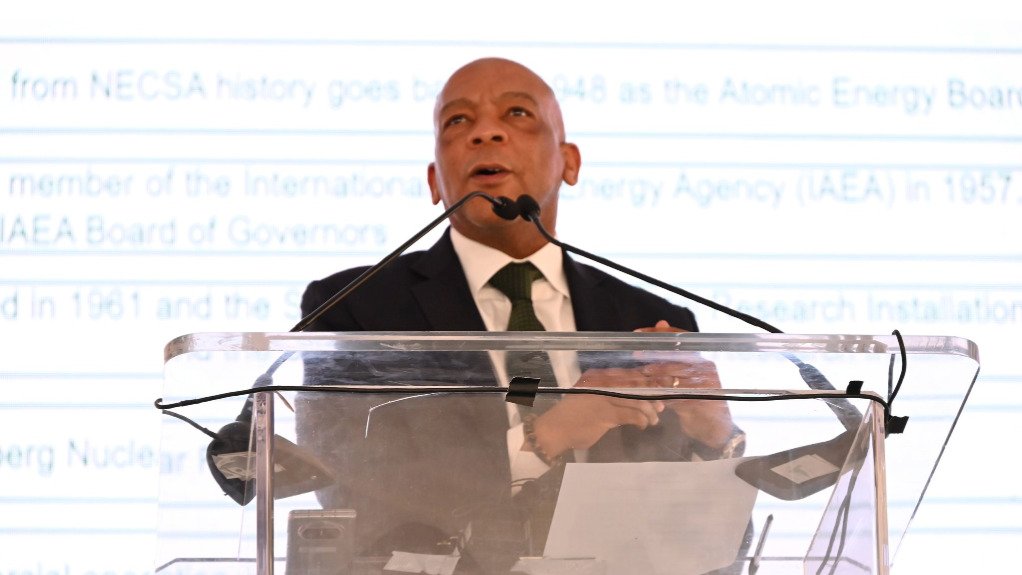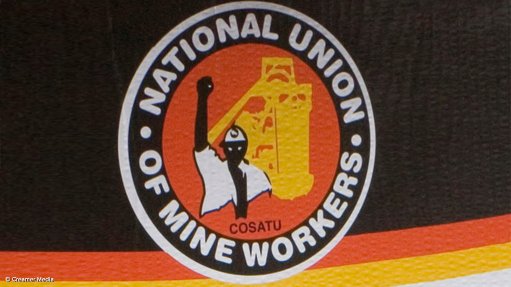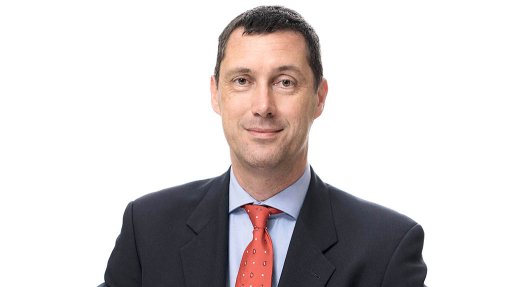Ramokgopa to seek advice from team of experts before taking next nuclear steps


Electricity and Energy Minister Dr Kgosientsho Ramokgopa speaking at the nuclear summit
Electricity and Energy Minister Dr Kgosientsho Ramokgopa is assembling a committee of experts to advise him on the role that nuclear could play in South Africa’s future supply before issuing a new Ministerial determination for the possible procurement of 2 500 MW of new nuclear capacity.
He has also reiterated that any possible future procurement would arise only if it was deemed to be affordable and after a “credible” public consultation process, acknowledging that the two previous procurement attempts had been “soiled” by a lack of transparency and allegations of malfeasance.
In August, Ramokgopa withdrew a Section 34 determination Gazetted in January for the procurement of 2 500 MW of new nuclear capacity after legal challenges by the Southern African Faith Communities’ Environment Institute and Earthlife Africa Johannesburg, as well as the Democratic Alliance highlighting irregularities with the notice, including a lack of public consultation relating to the regulator’s concurrence with the determination.
An indication was then given by the Department of Mineral Resources and Energy (DMRE) that a new determination would be prepared for consideration by the National Energy Regulator of South Africa (Nersa), with any concurrence arising to be subject to a proper public consultation process.
Speaking at a briefing on the sidelines of a DMRE nuclear summit held in Gauteng on September 12, Ramokgopa reported that he would also first be seeking the advice of an expert advisory group, which was currently still being assembled and the identities of the individuals were, thus, not provided.
“We're putting together that expert team that will advise me in answering the question on the pace and scale that we can afford,” he explained, referring to Decision 8 in the Integrated Resource Plan of 2019 (IRP 2019), which requires that any nuclear build programme should be pursued at an affordable pace and modular scale.
Although the IRP 2019 is in the process of being updated, Ramokgopa made no commitment to delaying the nuclear determination and procurement process until the update was Gazetted.
“The panel will advise on how we will unfold the process,” he added, while providing and assurance that the process would be “subjected to public participation”.
In parallel, work was also continuing on the possible procurement framework, with the DMRE having indicated that three options could be proposed to Cabinet: once where Eskom was the shareholder and operator; a second where Eskom was the operator and a majority owner, but with private ownership making up the balance, and the last where the private partner was the majority owner but Eskom remained the operator.
Speaking at the nuclear summit itself, Ramokgopa expressed strong support for additional nuclear capacity, in addition to extending the operating life of the two reactors at Koeberg, with Unit 1 having already secured a licence to operate for a further 20 years and Unit 2 having applied for a similar life extension.
He also labelled some of the current opposition to the technology as uninformed and frivolous and urged nuclear scientists to defend their discipline and “articulate a coherent and compelling story of nuclear”.
In a virtual address, International Atomic Energy Agency director-general Rafael Grossi argued that there was a growing acceptance of the technology’s role in meeting the net-zero objectives, following the scepticism that had arisen in the wake of the Fukushima disaster of 2011.
“Some people say there's a nuclear renaissance. No, I don't think so. I think there is a return to realism,” Grossi asserted.
He said that was reflected in the COP28 declaration, which included a commitment to advance a global aspirational goal of tripling the nuclear energy capacity of 2020 by 2050.
“This indicates that there is a conviction that, to put it very simply, without nuclear, we are not going … to achieve a decarbonised, stable energy mix in the future,” Grossi said.
Article Enquiry
Email Article
Save Article
Feedback
To advertise email advertising@creamermedia.co.za or click here
Announcements
What's On
Subscribe to improve your user experience...
Option 1 (equivalent of R125 a month):
Receive a weekly copy of Creamer Media's Engineering News & Mining Weekly magazine
(print copy for those in South Africa and e-magazine for those outside of South Africa)
Receive daily email newsletters
Access to full search results
Access archive of magazine back copies
Access to Projects in Progress
Access to ONE Research Report of your choice in PDF format
Option 2 (equivalent of R375 a month):
All benefits from Option 1
PLUS
Access to Creamer Media's Research Channel Africa for ALL Research Reports, in PDF format, on various industrial and mining sectors
including Electricity; Water; Energy Transition; Hydrogen; Roads, Rail and Ports; Coal; Gold; Platinum; Battery Metals; etc.
Already a subscriber?
Forgotten your password?
Receive weekly copy of Creamer Media's Engineering News & Mining Weekly magazine (print copy for those in South Africa and e-magazine for those outside of South Africa)
➕
Recieve daily email newsletters
➕
Access to full search results
➕
Access archive of magazine back copies
➕
Access to Projects in Progress
➕
Access to ONE Research Report of your choice in PDF format
RESEARCH CHANNEL AFRICA
R4500 (equivalent of R375 a month)
SUBSCRIBEAll benefits from Option 1
➕
Access to Creamer Media's Research Channel Africa for ALL Research Reports on various industrial and mining sectors, in PDF format, including on:
Electricity
➕
Water
➕
Energy Transition
➕
Hydrogen
➕
Roads, Rail and Ports
➕
Coal
➕
Gold
➕
Platinum
➕
Battery Metals
➕
etc.
Receive all benefits from Option 1 or Option 2 delivered to numerous people at your company
➕
Multiple User names and Passwords for simultaneous log-ins
➕
Intranet integration access to all in your organisation



















